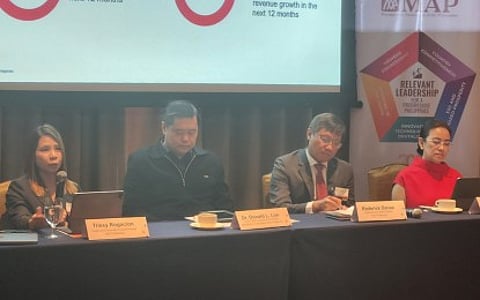85% optimistic but worry about geopolitics — poll
The majority of chief executive officers (CEOs) in large and medium enterprises remain optimistic about growing their enterprise in the next 12 months, even if some are still worried about the uncertainties brought about by geopolitical tensions.
This was revealed on Monday by consulting firm PwC Philippines and the Management Association of the Philippines after interviewing 168 managers, 68 percent of which belonged to large enterprises, 21 percent were medium-sized, and 7 percent and 5 percent were small and micro, respectively, for the 2024 Philippine CEO Survey, at the Shangri-La Makati.
In terms of business prospects, the survey, done from April to July this year, revealed that 85 percent of CEOs are confident that their company will experience a revenue uptick in the next 12 months.
Also, 85 percent of the surveyed CEOs said they are confident of their industry’s prospects for the next 12 months.
The CEOs said key growth drivers of the Philippine economy in the next 12 months are infrastructure development (59 percent), domestic consumption (51 percent) and foreign direct investments (41 percent).
Threats linger
The survey asked CEOs what’s keeping them awake at night, which 62 percent of respondents cited geopolitical uncertainties, namely the Russia-Ukraine war, Israel-Hamas conflict and territorial disputes in the South China Sea or West Philippine Sea.
The executives worry over the far-reaching implications for global trade, supply chains and economic stability, impacting businesses worldwide.
Roderick Danao, PwC Philippines chairperson and senior partner, explained that this uncertainty remains in the minds of CEOs as the country relies tremendously on imports, such as oil, among other raw materials.
But Danao maintained that CEOs remain upbeat about the global economy despite external pressures with 52 percent believing that global growth will improve in the next 12 months.
“Business leaders in the Philippines have been faced with significant challenges stemming from global economic uncertainties, geopolitical tensions and inflationary pressures, but they are continuously adapting and innovating,” Danao said.
“It is heartening to see that though many difficulties persist both within the country and outside it, business leaders remain adaptive and optimistic,” he added.
In terms of key threats, 91 percent of CEOs believe that they are exposed to macroeconomic volatility; 89 percent are exposed to inflation and 83 percent said they are exposed to cyber risks.
With the advent of technology and artificial intelligence, 60 percent of CEOs said Generative AI will enhance their company’s ability to build trust with stakeholders; 71 percent said GenAI will significantly change the way their company creates, delivers, and captures values, and GenAI will require most of their workforce to develop new skills.
Business leaders were also asked how they are reinventing their businesses to ensure longevity, such as through investing in generative Al (GenAl). Though three-fourths of the respondents agreed that GenAl can improve their products or services and make their processes more efficient, GenAl adoption remains low, with only 39 percent having implemented it in their organizations.
“Nonetheless, incorporating technology into operations is a priority for organizations. In the next 12 months, the majority of CEOs plan to make investments in upskilling their workforce in priority areas, automating processes and systems and deploying advanced technologies like Al and cloud to better equip their companies for the evolving business environment,” the survey said.
The insights are part of the Philippine CEO Survey 2024, conducted from July to August among 168 business leaders. As the Knowledge Partner for the Management Association of the Philippines’ International CEO Conference, PwC Philippines carried out the survey that touches on the conference theme “Business in Five Movements: Wisdom, Passion and Inspiration Across Multiple Generations.”


